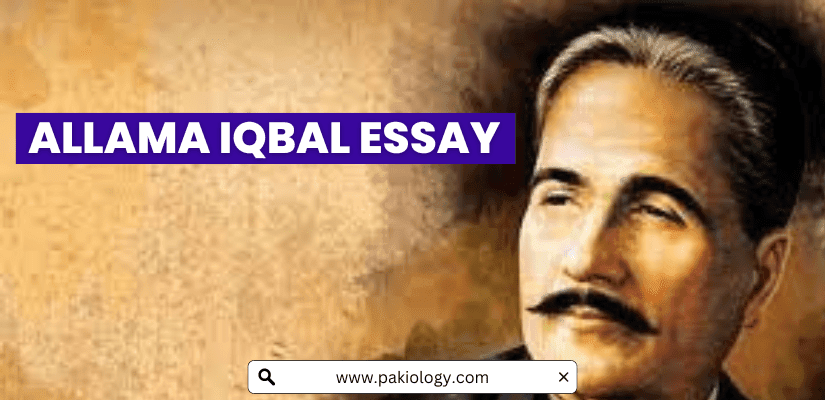Allama Iqbal was a philosopher, poet, and politician in British India who is widely regarded as having inspired the Pakistan Movement. He is considered one of the most important figures in Urdu literature, with literary work in both the Urdu and Persian languages.
Born in Sialkot, British India (now in Pakistan), Iqbal began studying philosophy, theology, and literature at an early age. Iqbal received his early education at a madrasa (Islamic school) in Sialkot. He then attended the Scotch Mission College in Sialkot, where he studied philosophy, English literature, and Arabic. In 1895, he received a Bachelor of Arts degree from the Government College University in Lahore, where he studied philosophy and Arabic. He obtained a Doctor of Philosophy degree in 1906, all from the University of Cambridge.
He then returned to India and became a professor of philosophy at the Government College University in Lahore. He also worked as a lawyer and served as a member of the Punjab Legislative Council. In 1927, he was appointed as the President of the All India Muslim League, a political party that sought to protect the rights of Muslims in British India.
Iqbal’s most well-known work is his poetry, which he wrote primarily in Persian. He is known for his poems that focus on spiritual, religious, and political themes. His most famous poems include “Lab Pe Aati Hai Dua Ban Ke Tamanna Meri” and “Tarana-e-Milli”.
In addition to his poetry, Iqbal was also a political leader and an advocate for the creation of a separate Muslim state in British India. He is credited with helping to shape the idea of Pakistan and is considered one of the founders of the country.
Iqbal’s philosophy, as expressed in his poetry and other writings, emphasized the spiritual and transcendent aspects of human experience, as well as the need for individual and collective self-realization. He believed that Islam, as a religion and a way of life, offered the best path to personal and social fulfillment.
Iqbal’s ideas continue to be influential in Pakistan and other parts of the Muslim world, and he is celebrated as a national hero in Pakistan. He is also remembered for his contributions to Urdu literature and the development of the Urdu language.
Iqbal’s poetry, written primarily in Persian, is considered some of the finest in the Urdu language. His poems, which often address spiritual and religious themes, are known for their deep insights and beautiful imagery. He is also credited with helping to revive the use of Persian in South Asian literature.
In addition to his poetry, Iqbal wrote a number of essays and treatises on philosophy, politics, and religion. His most famous philosophical work is the Asrar-e-Khudi (Secrets of the Self), which explores the concept of the self and the individual’s relationship with God.
One of Iqbal’s most famous poems in Urdu is “Lab Pe Aati Hai Dua Ban Ke Tamanna Meri” (A prayer rises to my lips), which is a poem about the power of prayer and the importance of seeking guidance from God. The poem is written in ghazal form, a popular style of Urdu poetry that originated in Arabia and is characterized by its use of rhyme and repetition.
Another famous poem by Iqbal is “Tarana-e-Milli” (The anthem of the nation), which is a patriotic poem that celebrates the national identity of Muslims in British India. The poem calls for unity among Muslims and encourages them to rise up against oppression and injustice.
Here is an example of one of his poems in Urdu:
جو چاہتا ہے اسے ملتا نہیں،
دل کی شوق کی جگہ نہیں دہر کے لئے ہے سارے دن
صبح کی روشنی کی جگہ نہیں
Translation:
He who desires, cannot be satisfied,
There is no place for the yearning of the heart All days are for eternity,
There is no place for the light of morning
This poem captures Iqbal’s ideas about the human condition and the search for meaning and fulfillment in life. It suggests that the things we desire in life are ultimately fleeting and unsatisfying, and that true fulfillment can only be found in a deeper, more spiritual connection with the world around us.
Iqbal died on April 21, 1938, in Lahore, British India. He is buried in Hazuri Bagh, Lahore, and his tomb is a popular tourist attraction. He is remembered as a national hero in Pakistan and is celebrated for his contributions to Urdu literature, philosophy, and politics.
Find more Essays on the following Topics


0 Comments